
Afrobeat is a Nigerian music genre that involves the combination of West African musical styles from mainly Nigeria such as the traditional Yoruba and Igbo music and highlife with American funk, jazz, and soul influences. With a focus on chanted vocals, complex intersecting rhythms, and percussion. The style was pioneered in the 1960s by Nigerian multi-instrumentalist and bandleader Fela Kuti, who is most known for popularizing the style both within and outside Nigeria. At the height of his popularity, he was referred to as one of Africa's most "challenging and charismatic music performers."
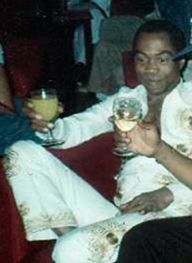
Fela Aníkúlápó Kútì, also famously known as Abàmì Ẹ̀dá, was a Nigerian musician, bandleader, composer, political activist, and Pan-Africanist. He is regarded as the King of Afrobeat, a Nigerian music genre that combines West African music with African-American funk and jazz. At the height of his popularity, he was referred to as one of Africa's most "challenging and charismatic music performers". AllMusic described him as "a musical and sociopolitical voice" of international significance.
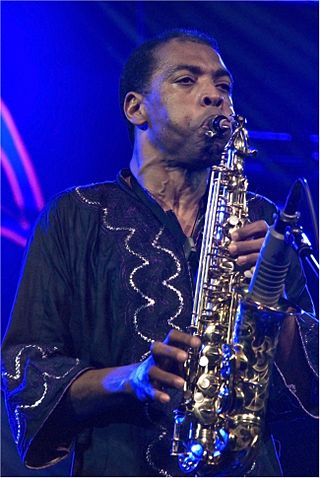
Olufela Olufemi Anikulapo Kuti, popularly known as Femi Kuti, is a Nigerian musician born in London and raised in Lagos. He is the eldest son of Afrobeat pioneer Fela Kuti and a grandchild of political campaigner, women's rights activist and traditional aristocrat Funmilayo Ransome-Kuti.
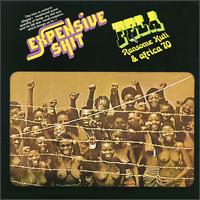
Expensive Shit is the twelfth full-length album by pioneering Afrobeat artist Fela Kuti and his Africa '70 band, released in 1975. It was reissued in 2000 by MCA Records, packaged with Kuti's He Miss Road (1975) on the same CD.

Zombie is a studio album by Nigerian Afrobeat musician Fela Kuti. It was released in Nigeria by Coconut Records in 1976, and in the United Kingdom by Creole Records in 1977.
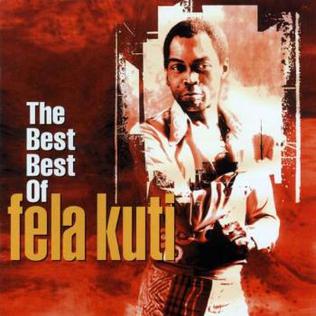
The Best Best of Fela Kuti is a 2-CD compilation album by Nigerian Afrobeat artist Fela Kuti, released in 1999 by MCA Records. It was issued in the United States in 2000 as part of a reissue series of Kuti's albums. The album was reissued as The Best of the Black President in 2009 by Knitting Factory Records and received universal acclaim from music critics. A companion 2-CD compilation, also released in 1999, was reissued in the U.S. in 2013 by Knitting Factory as The Best of the Black President 2.

Knitting Factory Records is an independent American music label that is notable for promoting a variety of artists, including the music of deceased Nigerian political activist Fela Kuti. The label promotes a variety of music artists including Ages and Ages, Ash Black Bufflo, Cuong Vu, Graham Haynes, Femi Kuti, Gary Lucas, Lumerians, Thomas Chapin, Patrolled By Radar, Joe Morris, Rachid Taha, Seun Kuti, and Shilpa Ray and her Happy Hookers.

Chief Funmilayo Ransome-Kuti, MON, also known as Funmilayo Aníkúlápó-Kuti, was a Nigerian educator, political campaigner, suffragist, and women's rights activist.

Oluseun Anikulapo Kuti, popularly known Seun Kuti, is a Nigerian musician, singer and the youngest son of Afrobeat pioneer Fela Kuti. Seun leads his father's former band Egypt 80.
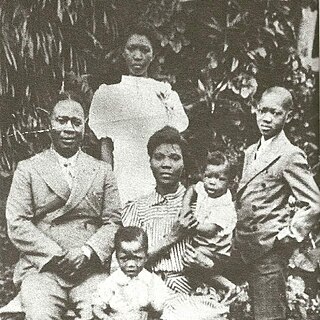
The Ransome-Kuti family is a Nigerian Yoruba political family noted for its simultaneous contributions to art, religion, education and medicine. It belongs to the Nigerian bourgeoisie, and also has historic links to the Nigerian chieftaincy system.

Lemi Ghariokwu, also known simply as Lemi, is a Nigerian painter, illustrator and designer who is most renowned for providing many of the original cover images for the recordings of Nigerian musician Fela Kuti.
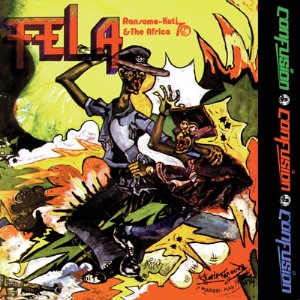
Confusion is a 1975 album by Nigerian Afrobeat musician Fela Kuti and his Africa 70 band. It was arranged, composed, and produced by Kuti, who recorded the album after choosing to emphasize his African heritage and nationalism in his music. Confusion is a commentary on the confused state of post-colonial Lagos and its lack of infrastructure and proper leadership at the time. Kuti's pidgin English lyrics depict difficult conditions in the city, including a frenetic, multilingual trading market and inextricable traffic jams in Lagos' major intersections.
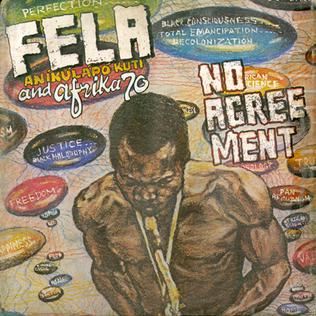
No Agreement is an album by Nigerian Afrobeat composer, bandleader, and multi-instrumentalist Fela Kuti. It was recorded in 1977 and originally released on the Nigerian Decca label.

Sorrow Tears and Blood is an album by Nigerian Afrobeat composer, bandleader, and multi-instrumentalist Fela Kuti. It was recorded in 1977 and originally released on the Nigerian Kalakuta label.

Shuffering and Shmiling is an album by Nigerian Afrobeat composer, bandleader, and multi-instrumentalist Fela Kuti. It was recorded in 1977 and released on the Nigerian Coconut label.

Unknown Soldier is an album by Nigerian Afrobeat composer, bandleader and multi-instrumentalist Fela Kuti, recorded in 1979 and originally released on the Nigerian Skylark label.

Teacher Don't Teach Me Nonsense is a 1986 studio album by Fela Kuti and the Egypt 80.

Army Arrangement is a 1985 studio album by Fela Kuti.

Ọmọ́rìnmádé Kútì known professionally as Made Kuti, is a Nigerian afrobeat singer, songwriter and instrumentalist. He released his debut album titled For(e)ward in 2021.
Bayo Martins (1932–2003) was a Nigerian jazz musician. A drummer and conga player, he is considered a pioneer of Afro-jazz. He was a member of some pioneering African musical ensembles.



















